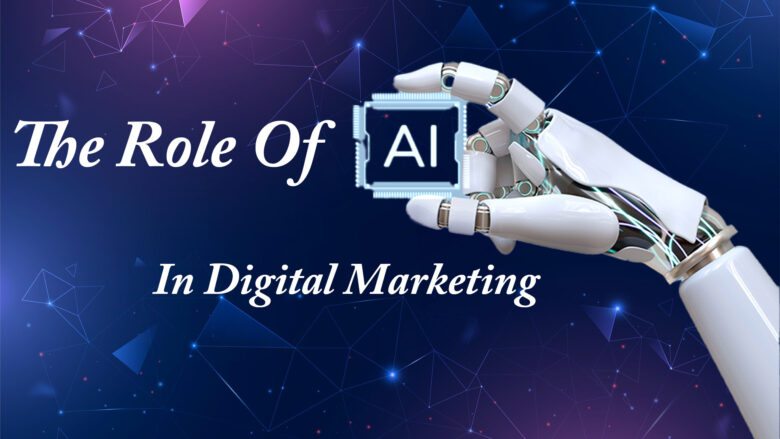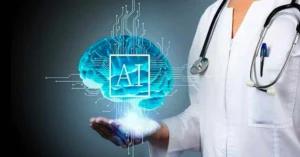Artificial intelligence has transformed several industries, including digital marketing. Artificial intelligence helps companies reach and engage customers in the digital world to stay ahead of the competition. Artificial intelligence is used in data analysis, consumer segmentation, personalized content and automated customer service in digital marketing.
Artificial Intelligence Powered Data Analysis:
Artificial intelligence plays an important role in digital marketing data analysis. Digital marketing creates massive amounts of data from social media, websites, emails, etc. AI-powered systems analyze this data faster and more accurately than humans. These tools can discover patterns and trends that humans cannot. Artificial intelligence helps marketers optimize campaigns, identify trends and make data-driven decisions by assessing consumer behavior, preferences and interactions.
Improve Customer Segmentation:
Artificial intelligence helps segment customers by assessing their activities, preferences and demographics. Simple demographics can limit traditional segmentation methods. However, artificial intelligence can analyze customer data, including shopping history, browsing behavior and social media activity. This deeper understanding helps marketers design more targeted and effective marketing strategies based on the needs and preferences of each segment.
Customized Marketing:
Modern digital marketing relies on artificial intelligence for personalization. AI systems can use customer profiles to personalize content and recommendations. Artificial intelligence can personalize email marketing efforts based on the interests and needs of each recipient. This level of personalization can increase engagement and conversion rates because customers respond better to personalized content.
Optimize Content Production:
The development of digital marketing content is also changing with artificial intelligence. Artificial intelligence-powered technology can quickly produce high-quality materials. NLP and machine learning algorithms enable these technologies to understand human language and create content that resonates with audiences. Artificial intelligence can also help curate content by evaluating large amounts of data and selecting the best material for customers. This saves marketers time and keeps the content fresh and engaging.
Better Customer Experience:
Digital marketing customers benefit from faster, more efficient AI customer service. AI-powered chatbots and virtual assistants can answer customer questions 24/7. These AI applications can answer frequently asked questions, recommend products and process orders. AI-powered customer support systems improve customer satisfaction and free up human agents to handle more complex situations with immediate, accurate responses.
Predictive Analytics:
Another area where artificial intelligence is transforming digital marketing is predictive analytics. Artificial intelligence algorithms can use past data to predict trends and outcomes. This allows marketers to predict customer behavior and take proactive action. Marketers can better manage resources by using predictive analytics to predict the future popularity of products. Artificial intelligence can also predict customer churn and provide retention methods.
Optimize Ads:
Artificial intelligence is changing the creation, targeting and optimization of digital advertising. Artificial intelligence can scan massive data sets to find the best ad placements, sizes and targeting techniques. These technologies can monitor ad performance and make real-time adjustments to improve ROI. Artificial intelligence automates ad optimization to maximize digital marketing efforts and reach the right audience at the right time.
SM Marketing:
Artificial intelligence analyzes social media data and provides insights into customer behavior and sentiment, which is crucial for social media marketing. AI-powered systems can track brand mentions, customer sentiment, and trending topics on social media. This data allows marketers to assess brand perception and quickly respond to customer feedback. Artificial intelligence can also suggest ideal post times, the best hashtags, and material that resonates with your target audience on social media.
Content and SEO:
Digital marketing depends on SEO, and artificial intelligence improves this. Artificial intelligence technology can study search engine algorithms and reveal ranking determinants. These programs suggest the use of keywords, meta tags and backlinks for website optimization. Artificial intelligence can monitor SEO performance and make real-time adjustments to improve rankings. SEO and artificial intelligence can help companies make their content discoverable to their target audience.
Moral Issue:
Artificial intelligence has many benefits for digital marketing, but it also raises ethical questions. Artificial intelligence in digital marketing collects and analyzes a fixed amount of personal data. Marketers must use this information responsibly and in accordance with privacy laws. Artificial intelligence can amplify biases in training materials. Marketers must ensure their AI tools are unbiased. AI-driven marketing must be transparent and accountable to maintain consumer trust.
The Future of Artificial Intelligence in Digital Marketing:
New AI applications and improvements in digital marketing are constantly emerging. As artificial intelligence advances, its impact on digital marketing will increase. More advanced artificial intelligence can improve data analysis, personalization and marketing efficiency. In the rapidly changing digital landscape, marketers who embrace artificial intelligence and keep up with trends will thrive.
Conclusion:
Finally, artificial intelligence is revolutionizing digital marketing through data analytics, customer segmentation, personalization, content creation, customer service, predictive analytics, advertising optimization, social media marketing, search engine optimization, and content optimization. Despite ethical concerns, artificial intelligence in digital marketing has undeniable advantages. As AI technology continues to develop, it will help marketers communicate with customers and achieve business goals.
FAQs:
1. How does AI help in digital marketing customer segmentation?
Artificial intelligence analyzes customer data, including behavior, preferences and demographics, to segment customers. In addition to demographics, this detailed research can help marketers design more targeted and effective marketing strategies based on the needs and preferences of each segment.
2. How does artificial intelligence impact digital marketing content creation?
AI uses NLP and machine learning algorithms to create high-quality content quickly and efficiently. It also helps in curating relevant content for customers. It saves advertisers time and keeps the content fresh and attractive.
3. How does AI improve the consumer experience in digital marketing?
Chatbots and 24/7 virtual assistants use artificial intelligence to improve customer service. These AI-powered systems can answer customer questions, recommend products, and process orders quickly and accurately, improving customer satisfaction and freeing human agents to tackle tougher challenges.
4. Will Artificial Intelligence in Digital Marketing Have Ethical Implications?
Artificial intelligence in digital marketing collects and analyzes large amounts of personal data, creating privacy concerns. Marketers must use data responsibly and comply with privacy laws. Marketers must also use fair and unbiased AI tools to avoid perpetuating data bias. Maintaining consumer trust requires transparency and accountability.
5. How does AI optimize digital marketing advertising?
Artificial intelligence analyzes massive data sets to find the best ad placements, sizes and targeting methods. Artificial intelligence technology can monitor ad performance and make real-time adjustments to maximize return on investment, ensuring digital marketing campaigns reach the right audience at the right time.



